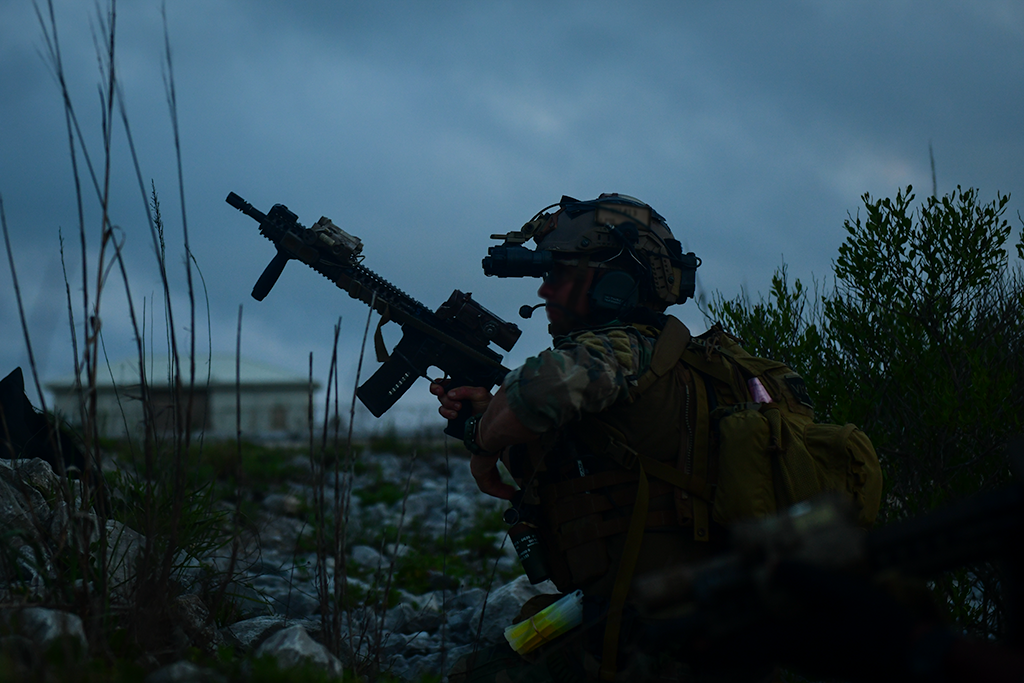We've all been there- standing on the ledge staring into the abyss. Wishing for a moment that it was staring back at you and simultaneously happy to be completely alone in that moment. For a brief second having an existential crisis, then snapping back to reality and wondering why the hell I'm thinking this?
So, what is Psychological State?
It’s obvious, but nevertheless important to recognize that we’re all human. Whilst the media and society often portray tactical professionals to be emotionless cyborg type characters, at SOFlete, we appreciate that there’s a real person underneath every uniform and behind every badge. With that in mind, we need to acknowledge and understand just how impactful your psychological state can be.
At this point, we’d like to introduce the concept of ‘lenses’. We’ve found this to be useful to help explain how your feelings and moods can alter your perception of the world. Think about your last trip to the optician; chances are, during your eye exam you were sitting in front of a big machine whilst the eye doctor systematically changed the glass lenses you were looking through, in order to find the one that provided the most clarity. Now extend this analogy to think about psychological state. If you had the morning from hell- you overslept, ran out of coffee, had a terrible commute to work and then got yelled at by your boss on arrival; your perspective, or ‘lens’, through which you’ll view the world immediately afterwards will be very different in comparison to if you’d been able to start the day on a more positive note. Now, we appreciate that the examples we gave are relatively arbitrary, but we’re simply trying to illustrate the concept that your experiences (both acute, like your car not starting; or chronic, like having to provide long term medical care for a sick family member) will shape the lens (both positively and negatively) through which you view and interact with the world around you. It’s easy to turn on the TV or check social media and become overwhelmed by all the craziness going on around the world. Understandably, being exposed to things like this on a daily or even hourly basis, is likely to have some effect on you and consequently may even affect your mood. We know from the research that mind and body are inextricably linked- with things like thoughts and feelings affecting your physiology, and equally, physiology being able to to affect your thoughts and feelings.

You can take thirty seconds to experiment quickly on yourself. This is a great chance to practice our ‘Be Your Own Scientist’ philosophy. This is where we take a baseline reading or measurement, change (or implement) something and then re-test and decide if and how effective the change has been and thus whether it’s worth pursuing. So, initially, stop and get some kind of a baseline to how you’re feeling right now. If you’re well practiced at this, you might be able to generate a deep and complex quantification; whereas if you’re new to all this, just start by picturing a traffic light or smiley system- are you feeling positive, neutral or negative? Now we want to try implementing a change; so we’ll create some physiological changes: clench your fists and jaw hard, snarl as you breathe in and out in short, shallow breaths. Do this for twenty to thirty seconds and then take a moment to re-test and see how you’re feeling compared to that baseline. If you’re like most people, you’ll feel more aggressive and maybe even angry; this is a great demonstration that simply by changing your physiology you can change your thoughts and mood. However, it also works the other way- we can use the mind to control physiology too. Now, check your heart rate- use this as a baseline. Close your eyes and picture yourself in a place where you feel the most relaxed; this might be a favorite vacation or a childhood memory. Try to recreate this environment as vividly as possible, including imagining the people you’d like to see there (try to really picture their faces and ‘hear’ their voices etc) and even smells (e.g. the ocean, pine trees or your Grandma’s cooking). Take the same twenty to thirty seconds to enjoy being in this scene, then recheck your heart rate. Chances are it, along with things like your blood pressure, breathing rate and even the amount of tension in your muscles will have decreased.
Now obviously these examples are pretty crude; however, seeing those news or social media articles can and will cause exactly the same effect as the first exercise; albeit hopefully at a lower intensity. Not only can this have very real consequences on your health, it can also significantly impact your performance. Although we’d sometimes like to be able to disengage from our emotions, as humans we don’t have this luxury. Consequently, any time you are required to make a decision or react to a situation, we need to appreciate that you will be viewing this situation through the lens that has been (and continues to be) influenced by your mood and thoughts. This is something that undoubtedly most tactical professionals can relate to. Think about a high stress situation you might encounter in your role. Imagine how you might react in that situation when you were in the worst mood possible, compared to when you were at your most positive. Even the most professional of us will be able to admit that our corresponding actions might well be different; and this is the vital aspect of understanding this concept. We aren’t telling you that you need to learn infinite patience and tolerance, so that you can walk around like some kind of ‘zen-Yoda-monk’ hybrid twenty four hours a day! We’re saying that it’s really important, that as both a human and a tactical professional, you understand that your mood and feelings will almost certainly affect your decisions and resultant actions. Knowing this, allows you to start being more mindful of this connection, which opens the possibility of increasing the amount of control you have over your mood and actions.
Why Your Psychological State is Important
As we discussed in the previous section, the mind and the body are closely interlinked. Consequently if one is dysfunctional (however we define this), or even sub-optimal, we can’t expect the other to thrive to the level demanded of a tactical professional. Given how relatively little attention is paid to psychological preparation and support, in comparison to the physical (e.g. gym time) and technical (e.g. completing range packages), there are huge opportunities here to make significant improvements in both health and performance.
Earlier we touched on the concept of mindfulness or awareness. We acknowledged that you don’t need to be in a ‘perfect’ psychological state all day, every day. We just need you to be able to recognize when things aren’t as you’d like them to be, so that you can do something about it. Think of this like weapons handling training; many tactical professionals are taught (often ad nauseum!) how to pre-empt, diagnose and correct weapon system malfunctions. We can use exactly the same process with psychological state ‘malfunctions’. If, after conducting a ‘tactical pause’ (a brief period of time where you run a quick internal assessment of how you’re feeling and performing), we know that the risk of making a poor decision is high due to your current mood or state, we can put proactive strategies or protocols into place by leveraging the various up or downregulation strategies.
Psychological State and Chronic Pain
Managing chronic pain, an unfortunately all too common occurrence in the tactical world, can also be considered the same way. Whilst pain, and especially chronic pain, is an incredibly complex topic (that’s far beyond the scope of this piece), it’s important to recognize that it has the potential to strongly influence the lens through which you perceive and interact with the outside world. For anyone who’s experienced moderate to severe pain for any length of time, you’ll probably sadly be familiar with these changes- the loss of enjoyment and happiness from previously fun activities as well as difficulty in getting motivated or inspired for anything. Effectively, the pain changes the lens or filter through which you’re interacting with the world and those around you; this is why for many, managing chronic pain can be an extremely difficult experience and one that we’d highly recommend you consult a professional to help with. However, the point we’re trying to make here is that it’s the pain that has caused your lens to change, not the activity. Mountain biking, deadlifting or even playing with your kids aren’t any less fun or enjoyable an activity; it’s just that if you’re in pain, you're currently perceiving them differently. This should hopefully be a tremendous source of motivation, because it means that as you recover, these activities will be waiting for you to return to them. As an additional bonus, just like we said at the start of this section- as the brain and body are so closely connected, simply understanding that it’s the pain that’s changed your filter, not you or your world that’s changed, you might well find that some of your pain levels turn down a fraction. This will have an immediate and direct impact on your lens, which should cause your pain levels to turn down a fraction more… harnessing this thought process can act as a significant driver towards generating an upward spiral of recovery.
Until now, we’ve only been considering you in isolation; however, as both a human and a tactical professional, how you interact with those around you (everyone from family members to suspects) involves an extraordinary amount of verbal and especially non-verbal communication. Most people have a pretty good idea of when someone they know is happy, sad or angry, without that person even needing to express it vocally. In fact, humans are surprisingly receptive to these non-verbal cues, so it’s worth considering what kind of impact your mood and consequently both verbal and non-verbal communication is having on those around you. This is particularly prevalent given, not only the tightly knit units that many tactical professionals work in, but also the frequent interpersonal interactions that occur whilst on duty- such as a firefighter talking to a casualty or a police officer questioning a suspect.
How you interact with those around you is of vital importance to both your professional and personal life, so it’s important to get into the habit of taking a moment to try and understand how your current lens might be distorting your view of the world around you. Once you become more self aware, this will allow you to become something of a stable reference point for those around you, thus helping them too.
Additional Resources
- SOFlete’s Yoga Breathing is Science (https://www.youtube.com/watch?v=ldCAZ02jANA)
- Dr Kate Pate (our go-to neuroscientist and practitioner) (https://www.instagram.com/doc.pate/channel/)




Leave a comment
This site is protected by hCaptcha and the hCaptcha Privacy Policy and Terms of Service apply.